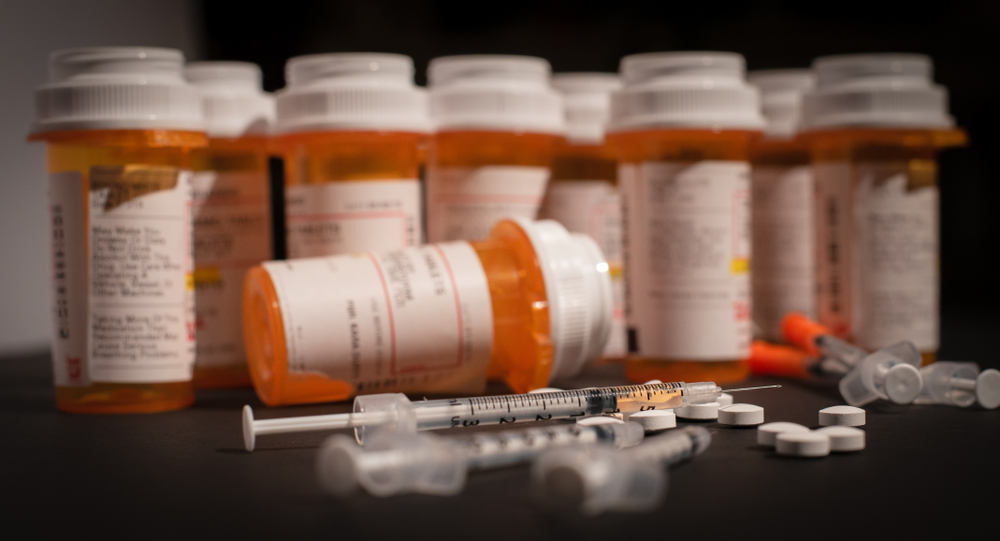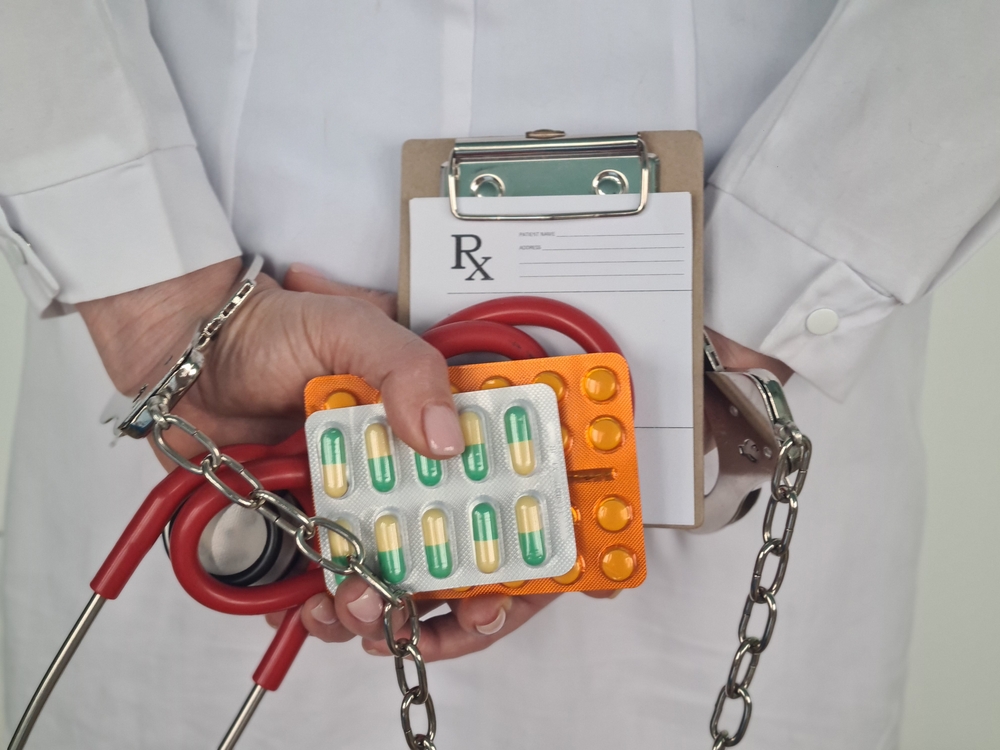Last Updated:
May 29th, 2025

A YouGov study highlights how over half of all people in Britain are currently taking prescription drugs. As prescription drugs are such commonplace parts of our lives, it is easy to overlook how quickly dependence on them may develop, as well as how challenging recovery can be.
Each person with an addiction conceptualises recovery differently, but understanding the factors that influence the recovery journey can bring reassurance.
We’re exploring which factors affect the recovery timeline for prescription drug addiction and what to expect on the road to recovery.
What is prescription drug addiction?
Prescription drug addiction happens when a person becomes addicted to a medication they have been prescribed by a healthcare professional. This may be from a GP, hospital doctor, nurse, or pharmacist.
Prescribed drugs are intended to help treat a medical issue for a patient and come with a note of intended use written by the prescriber. While these drugs can be essential for short-term illness management, many carry a high potential for misuse and addiction.
When a person takes the drug outside of the prescriber’s intended use, this constitutes “drug misuse” and can quickly slip into addiction. There are multiple reasons for drug misuse, including, but not limited to:
- Pain management: Experiencing chronic pain can lead a person to take drugs outside of intended use.
- Recreation: People seek the effects of certain medications with a euphoric effect, like benzodiazepines and opioids.
- Dependency: Even before addiction takes hold, a person can feel as though they cannot function “normally” without a substance.
In addition, there are also social factors that can sway a person into taking a substance outside of its intended use. Peer pressure and mental health disorders can play a large role in drug misuse, leading to addiction.
What are the most commonly prescribed drugs?
According to reports from the UK government, more than 10 million people (a quarter of the adult population) receive one or more prescription drugs each year. Their data shows that the most commonly prescribed drugs in the UK are:
- Antidepressants – 7.3 million people (17% of the adult population)
- Opioid pain medicines – 5.6 million (13%)
- Gabapentinoids – 1.5 million (3%)
- Benzodiazepines – 1.4 million (3%)
- Z-drugs (zolpidem, zopiclone, and zaleplon) – 1.0 million (2%)
All of these prescribed medications carry a medium to high potential for abuse and addiction-forming.
What does recovery from prescription drug addiction involve?
Recovering from a prescription drug addiction requires more than just cessation. It often needs a step-by-step process that supports both the body and mind as a person strives for long-term sobriety.
Every journey is different, but most treatment pathways use three key stages:
Detox and withdrawal management
The first step in recovery involves cessation and detoxification from the substance itself. As the drug is flushed from your system, it takes anywhere from a few days to a couple of weeks, depending on various factors of dosage and length of use.
In this time, withdrawal symptoms from prescribed medications are common, which include:
- Anxiety and depression
- Strong mood swings
- Sleep disturbances
- Disorientation
- Shivering
- Weight loss
- Heightened sensitivity
Managing these symptoms is often difficult, which is why staff are trained in helping you mitigate their severity.

Rehab and structured treatment
When you approach complete detoxification from a prescription drug, the focus shifts to treating the root causes of addictive behaviours. These are often highly complex and can be linked with multifaceted psychological triggers. Inpatient and outpatient programmes often incorporate evidence-based therapies like cognitive behavioural therapy (CBT), group counselling and relapse prevention planning. A prescription drug rehab programme typically lasts 30 days, but some programmes extend to 60 or 90 days. If the addiction is milder, a person may only need to stay in treatment for a few weeks.
Aftercare and ongoing support
Recovery doesn’t end when rehab does. Treatment providers understand the critical need for sustained support and care as you readjust to sober life. Ongoing programmes like outpatient therapy and support groups help you cope with managing cravings and urges. Unfortunately, research shows that up to 85% of people relapse within the first year of recovery, mainly stemming from inadequate aftercare support.
How long does recovery take?
Recovering from a prescription drug addiction may follow a general timeframe, but it is not set in stone for every person. Some people can enter recovery phases faster than others, while others can take years to rebuild their mental and physical well-being.
One of the most important aspects to remember is that recovery is a process, not a
deadline.
Short-term vs. long-term recovery
Although each person’s concept of complete recovery may differ, the process is often thought of as being stepped or unfolding in stages. Clinical research shows how focusing on inherent emotional challenges can benefit each stage.
- Early recovery (first few months): In this period, many people are more emotionally fragile and still filled with uncertainties about sustained recovery. For early recovery, emphasis is usually placed on the basics: achieving abstinence, managing cravings and preventing relapse.
- Middle stage recovery (3 months to a year): This is sometimes called the “action stage” of recovery, within which focus shifts to a deeper understanding of how prescription drug addiction has previously affected the most key areas of life. There are emotional highs and lows, as well as some amount of grieving for the loss of old coping mechanisms. Support is centred on healthier and stronger ways to cope and learning to navigate emotions without relapsing.
- Long-term recovery (a year onwards): As most people relapse within one year after treatment, the one-year milestone may be a useful benchmark for measuring long-term, sustained recovery. This is sometimes labelled as the “maintenance stage,” where the continuation of the previous action stage becomes the foundation for a more meaningful life. There may still be persisting urges to substitute previous addictive behaviours with others, like food or sex. In this stage, you become aware of the urge to substitute and practice self-regulation with healthier coping strategies.
What factors influence recovery time?
There are a variety of psychological, medical and environmental factors that can all weigh heavily on a person’s recovery journey. The factors affecting prescription drug addiction recovery can include:
- Type of drug used: Each prescription medication can have a stronger or weaker tendency to form an addiction when misused. Prescription opioids, for example, are typically the most commonly misused for their strong painkilling properties. Opioids and benzodiazepines often require longer drug detox periods and pose higher relapse risks.
- Length and severity of use: The longer someone has been using a drug, or the higher dose they’re used to, the more time is needed for the body and brain to stabilise after cessation. Long-term use usually links to stronger cravings and more intense withdrawal symptoms.
- Mental health and co-occurring conditions: Mental health illnesses have extraordinarily high rates of co-occurrence with substance use disorders, showing in more than half of cases. Conditions like anxiety, depression and PTSD can prolong recovery if not treated alongside the prescription addiction.
- Support systems and environment: People with a healthy support system of friends, family and professionals tend to recover more steadily. If a person is in an unstable home environment, a codependent relationship, or has inadequate support, relapse risk can starkly increase.
Where can I get help for prescription drug addiction?
Recovering from a prescription drug addiction is incredibly difficult to do alone. If you’re struggling and feeling overwhelmed, please know that help is available, no matter how long you’ve been fighting your battle.
We understand how true healing takes time, so we’re here for you at every step. Our expert aftercare team is committed to helping you rebuild your life and regain control with confidence.
The road to recovery starts with a single step. Contact us today to start your healing.
(Click here to see works cited)
- Dinic, Milan. “The Yougov Big Survey on Drugs: Prescription Drugs.” YouGov, YouGov, 24 Jan. 2022, yougov.co.uk/society/articles/40279-yougov-big-survey-drugs-britons-taking-prescriptio.
- “Prescribed Medicines Review: Summary.” GOV.UK, www.gov.uk/government/publications/prescribed-medicines-review-report/prescribed-medicines-review-summary.
- Kitzinger RH Jr, Gardner JA, Moran M, Celkos C, Fasano N, Linares E, Muthee J, Royzner G. Habits and Routines of Adults in Early Recovery From Substance Use Disorder: Clinical and Research Implications From a Mixed Methodology Exploratory Study. Subst Abuse. 2023 Feb 11;17:11782218231153843. doi: 10.1177/11782218231153843. PMID: 36798446; PMCID: PMC9926005.
- Substance Abuse Treatment: Group Therapy [Internet]. Rockville (MD): Substance Abuse and Mental Health Services Administration (US); 2005. (Treatment Improvement Protocol (TIP) Series, No. 41.) 5 Stages of Treatment. Available from: https://www.ncbi.nlm.nih.gov/books/NBK64208/
- Drake RE, Mueser KT, Brunette MF. Management of persons with co-occurring severe mental illness and substance use disorder: program implications. World Psychiatry. 2007 Oct;6(3):131-6. PMID: 18188429; PMCID: PMC2174596.
- “Codependency: Signs and Symptoms.” WebMD, WebMD, www.webmd.com/mental-health/signs-codependency

